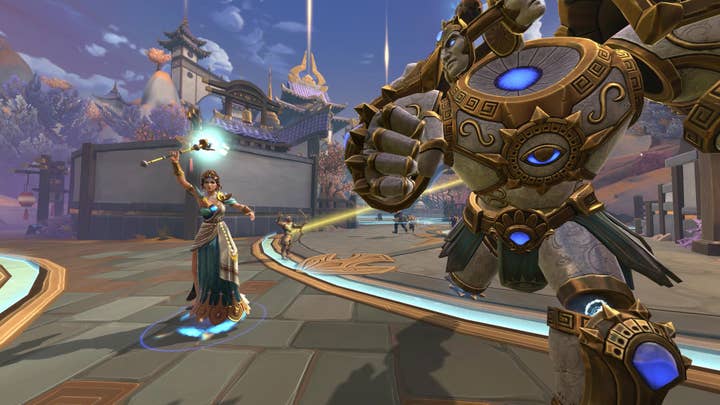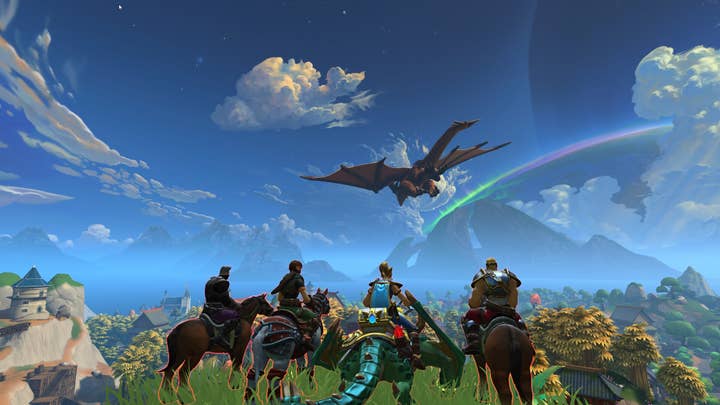The industry will rally soon, says RallyHere head
Hi-Rez president and RallyHere CEO Stewart Chisam says we're seeing a bullwhip effect from COVID and the recovery will begin this quarter
It's been a difficult year across the games industry, but the games-as-a-service sector has had some additional concerns all its own, from the trend of just-launched and seemingly successful titles being unexpectedly shut down to Destiny 2 reportedly missing its revenue projections by almost half, there are some questions about what's happening in live service games.
We put these questions to Stewart Chisam at the Montreal International Games Summit last month. As the president of Smite and Paladins company Hi-Rez Ventures and the CEO of Hi-Rez subsidiary and live service game operational support company RallyHere, Chisam has some expertise on the subject, and he seems fairly optimistic about the underlying health of the segment.

"Realistically, I think there's a big COVID hangover in games-as-a-service," Chisam says. "I have a background in supply chains and in supply chains we would call this a bullwhip effect. We had a surge in demand overnight when the pandemic happened. All of our games and practically every other game saw their engagement go up by 50% in many cases, literally overnight. Many more people poured in, and not just numbers of people, but the hours players were putting into the game.
"With that came a massive surge of investment in the industry. And some of this had started before the pandemic, mostly in 2018 when Fortnite really took off. A lot of people saw that success and wanted a piece of that pie, so a lot of venture money and other money came into the industry at the time."
Naturally, some of that money went to chasing live service games. But with the pandemic effect on engagement metrics fading and interest rates rising, Chisam says there were just more people chasing it than the market could support this year.
"I do absolutely think we got oversupplied as an industry," he says. "Especially as the pandemic started to wind down and player habits started to go back to normal."
I do absolutely think we got oversupplied [with live service games] as an industry"
As a result, the growth slowed and Chisam figures the industry is now reverting to the size it would have been if it had just continued its standard growth trends since 2015 instead of seeing the pandemic acceleration.
"It's correcting itself pretty quickly in my view," he says, acknowledging that Hi-Rez itself laid people off in a restructuring earlier this year. "It's hard on everyone in the industry to go through that course correction. We felt some of that in our business and had to trim down our ambitions some in terms of the number of new games we're launching. A lot of other studios have done that; it's a lot of getting back to basics.
"Personally I feel sometime this quarter we'll hit the low point and then really start coming back and growing again as an industry and get past that."
Naturally, as head of a live service games developer and service provider, Chisam believes in the market. He points to a few macro-trends that drove live service games' growth in recent years, and emphasizes that they aren't about to reverse course.
"People want to play games with their friends no matter what platform those friends play on," he says. "They also want to be able to move across platforms seamlessly."
He says people don't think as much these days about whether they're on a specific console or PC, TV or mobile, controller or mouse-and-keyboard.
"You want to have portability across those experiences," Chisam says. "That's a trend that's not going anywhere. People want to play with their friends, so multiplayer social experiences is a trend I don't think is going anywhere. And people want flexibility to play with their friends easily, and that continues to keep the free-to-play model attractive because now I don't have to convince you to buy something in order to play with me and have a social experience."
But as we've seen this year especially, there's a limit to how far those trends can grow the market.
"The bigger question is how many games like that can the market support," Chisam says. "I think that's what the industry's trying to figure out. Obviously the biggest games in the industry soak up a lot of aggregate player hours, and that only leaves so many player hours to go around for other experiences.
"There's still the opportunity for big new things to come out, and they do every year to disrupt that and move a lot of player hours to brand new things. But everyone's figuring it out. It's a tough time in the industry, but if you look at the macro trends from the player perspective, I don't think anything changed fundamentally about what players want from their video games, so those big trends will stay true."

The end result is that now might not be the best time to launch a live service game. On the other hand, Chisam suggests that the point when a particular genre or style of game falls out of fashion isn't always the worst time to start working on one.
"I am a subscriber to the theory that there's three kinds of trend following," Chisam says. "One is something fresh and new comes out. If you're a fast follower on that, there's normally a lot of great opportunity. Fortnite wasn't the first battle royale. Even PUBG wasn't the first, but they saw innovative experiences and got to market earlier with innovative business models and that was very successful."
Fortnite wasn't the first battle royale. Even PUBG wasn't the first, but they saw innovative experiences and got to market earlier with innovative business models
So fast following works, and Chisam says Hi-Rez benefitted from it with Smite getting a MOBA onto consoles when it did. As for the other two ways to trend-follow – slow following and something in between – Chisam said being exceptionally late to the party can also work because so many trends in the industry are cyclical.
"If you come on board almost as the last cycle is ending and there's a lag, by the time you get [your game] out, people got kind of turned off by [that genre] and the field goes fallow for a few years, then people are ready for new experiences in that genre.
"Where you get into a huge amount of danger is in the middle," he says. "The games industry is really susceptible to that because it takes so long to make games.
"You can look at extraction shooters as a segment and say this is a great segment, it's under-supplied and I need to make a game in this segment. The only problem is 50 other people had the same conclusion and they went in at the same time and it takes a couple years to make a game. So you're under-supplied, under-supplied, under-supplied, and then all of a sudden you're rapidly over-supplied."
Still, he emphasizes that's a temporary problem.
"When we look at what we think is going to happen in the industry in 2024, 2025, and 2026, we think that's going to settle itself out," he says. "The industry's continuing to grow and it's still the best industry to be in, in entertainment. I'd still much rather be in gaming for the long term than in other segments of entertainment.
"I still believe the future of gaming is very bright. And you see that in each generation that's growing up, even older generations like mine are still gaming. And that's creating a lot of growth. I think great times are coming. The issues the industry is having now? I think there's still a little more to happen in that shakeout over the next few months but I think we're pretty close to bottom and things will be coming back up soon."









